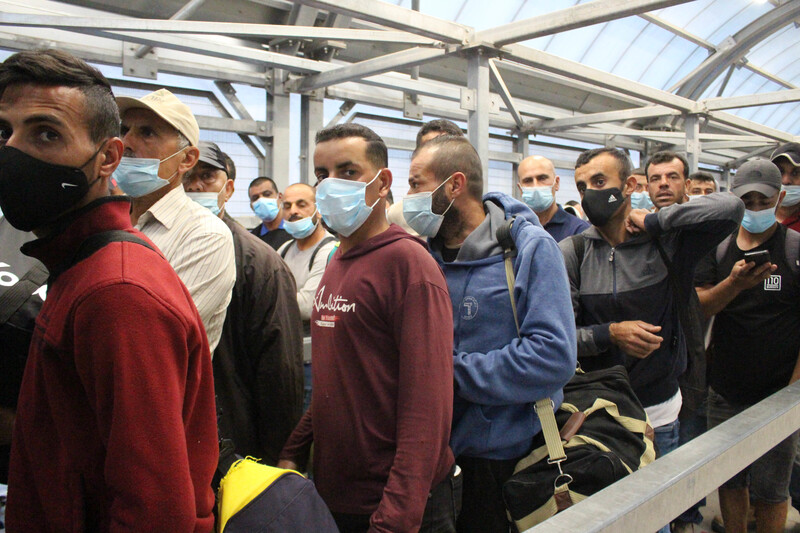Rights and Accountability 6 July 2020

Palestinian laborers queue to enter Israel via the Mitar checkpoint in the West Bank city of Hebron on 28 June.
APA imagesThe number of confirmed COVID-19 cases has risen almost sevenfold in the occupied West Bank over the past three weeks.
The total number of cases jumped from 690 on 16 June to more than 4,700 on 6 July.
There have been 20 deaths in the West Bank, more than half of them recorded in the past week.
The United Nations monitoring group OCHA said this was one of the highest increase rates recorded worldwide during this period.
The Palestinian Authority has renewed lockdown measures in certain areas in light of the recent surge, after easing them in May.
The recent uptick has been attributed to the easing of restrictions – including reopening businesses and houses of worship.
Meanwhile, the total number of confirmed cases in Israel now exceeds 30,000. More than half of the people infected have recovered and 332 have died.
Initial antibody tests suggest that 2.5 percent of Israel’s population has been infected with the virus – more than 10 times the number of confirmed cases.
Restrictions renewed
Mohammad Shtayyeh, the Palestinian Authority’s prime minister, has urged Israel to close all the checkpoints in and out of the West Bank to stymie the spread.
Palestinian laborers who continue to work in Israel are believed to be a primary vector for the spread of COVID-19 in the West Bank.
Hundreds of thousands of workers travel between their homes in the West Bank and their jobs in Israel on a weekly basis.
In response to the recent surge, the Palestinian Authority imposed a week-long lockdown on Hebron in the southern West Bank and a two-day closure on Bethlehem to its north.
Shorter lockdowns were imposed on other Palestinian towns throughout the West Bank.
All shops were ordered closed, barring grocery stores, bakeries and pharmacies.
The Palestinian Authority renewed prohibitions on large gatherings, such as weddings, graduation parties and funerals.
Shtayyeh has appealed to the public to avoid holding such gatherings.
The Allenby Bridge separating the West Bank from Jordan has opened a number of times in recent weeks, allowing passengers to cross into the West Bank.
No exiting Gaza
No new cases of the coronavirus have been recorded in the Gaza Strip since 10 June.
This is largely due to a sharp decrease in the number of people moving in and out of Gaza in the past few weeks.
There have been 72 confirmed cases of COVID-19 in Gaza, one of them fatal. The vast majority of people infected have recovered.
The Rafah crossing between Gaza and Egypt has been closed by the Egyptian authorities. It is the sole entry and exit point for the vast majority of Gaza residents to the outside world.
The Erez checkpoint, the only crossing for people between Gaza and Israel, has been practically inoperative since March in an attempt to stymie the spread of COVID-19.
Exits from Gaza into Israel are limited to mostly medical cases in general.
But since the Palestinian Authority announced it was suspending coordination with the Israeli authorities on 21 May, Palestinians have had no means by which to apply for travel permits to enter Israel.
That includes Palestinians in need of critical medical treatment unavailable in the coastal enclave.
Human rights groups have sent a letter to the Israeli government demanding that Israel ensure that Palestinians with medical or humanitarian needs be allowed to travel outside Gaza.
“Israel may not, no matter the circumstances, prevent travel on procedural, bureaucratic grounds, all the more so when travel is required in order to exercise basic human rights,” the letter stated.
“Denying these individuals travel would be a blatant, severe violation of their fundamental rights, including the right to life and bodily integrity.”
The letter was signed by human rights groups Adalah, Gisha, Physicians for Human Rights – Israel, HaMoked and the Association for Civil Rights in Israel.
The Gaza authorities have decided that all those entering the Strip will be placed in mandatory three-week quarantine for the remainder of the year.
Israel’s siege on the territory has entered its 13th year.
Pandemic propaganda
The Kerem Shalom checkpoint, the only place Israel allows goods to enter and leave Gaza, is still operating.
COGAT, the bureaucratic arm of Israel’s military occupation, has been using the coronavirus pandemic as a propaganda opportunity to boast of the medical equipment and other supplies it allows into Gaza through the crossing.
COGAT has also boasted of making its occupation apparatus more efficient during the pandemic, in connecting the Qalandiya checkpoint in the West Bank directly to a bus station: COGAT masks its oppressive role as the bureaucratic arm of Israel’s military occupation through seemingly “humanitarian” acts, including trying to make the occupation more “efficient,” by adding high-tech systems to checkpoints and building shortcut routes.Such propaganda provides no comfort to the victims of Israeli oppression.




